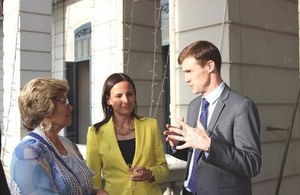British Ambassador John Casson launches £20m Newton-Mosharafa fund and celebrates success of over 100 Egyptian scholars
British Ambassador John Casson: “Newton-Mosharafa is British-Egyptian partnership at its best.”

British Ambassador John Casson has said that helping young Egyptians to fulfil their aspirations and transform their country’s future is at the heart of the British-Egyptian relationship.
Casson’s remarks came as he hosted a reception to celebrate the success of over 100 Egyptian scholars who have been awarded educational grants under the Newton-Mosharafa Fund, a British-Egyptian science and innovation partnership worth £20m over five years.
The Fund’s aims are to foster long-term socio-economic development and develop close collaboration between the British and Egyptian science and innovation sectors. In its first year, the Fund has offered 64 PhD students fully-funded scholarships to study at top UK universities, awarded short-term fellowships to 25 young researchers, and established 9 research partnerships linking British and Egyptian institutions worth up to £300,000 each.
Casson said:
I am constantly inspired by the potential of Egypt’s youth. Today we see the amazing possibilities when world-class British science combines with brilliant young Egyptian minds to transform the future.
Newton-Mosharafa is British-Egyptian partnership at its best. This investment in these Egyptian scientists is a great source of hope for Egypt and the world.
Sylvia Daniel is one of the 64 young Egyptians who will be studying for their PhDs in the UK. Sylvia will study at University College London and will conduct her research on Chronic Obstructive Pulmonary Disease, a form of lung disease prevalent in Egypt that can be life-threatening and has a major impact on healthcare expenditure. Sylvia hopes that her research will lead to better management of the disease and could have a direct impact on the health of patients. She describes the opportunity provided by the Newton-Mosharafa Fund as “an experience of a lifetime”.
Mohamed Elwan will study at the University of Nottingham. The focus of his research will be on how protection, management, and development of water resources can support socio-economic development in Egypt. He says that scientific research is a central part of any country’s development. In addition to the academic opportunities provided by Newton-Mosharafa, he is looking for to building bridges between British and Egyptian cultures.
Sylvia and Mohamed’s research falls into two of the Newton-Mosharafa Fund’s five priority fields: water management, renewable energy, food production, archaeology and cultural heritage, and affordable and inclusive healthcare. These fields have been selected as key areas for Egypt’s socio-economic development, jointly selected by the Fund’s administering bodies: the British Embassy in Cairo, the British Council in Egypt, the Egyptian Science and Development Technology Fund, and the Ministry for Higher Education.
James Hampson, deputy director of the British Council in Egypt, said:
Every step of the way from design to implementation, the Newton-Mosharafa Fund has been about building effective and sustainable partnerships that will support Egypt’s long-term future.
Sending these inspiring young Egyptian scholars to the UK to study for their PhDs is not the end of Newton-Mosharafa, it is just the beginning. Already, Newton-Mosharafa is building institutional links between British and Egyptian universities. Together, we are setting the foundations of a long-term partnership in science and innovation between the UK and Egypt.
The Newton-Mosharafa Fund is named after British mathematician and physicist Sir Isaac Newton, regarded one of the most influential scientists in history, and the Egyptian theoretical physicist Ali Moustafa Mosharafa, who contributed to the development of quantum theory.